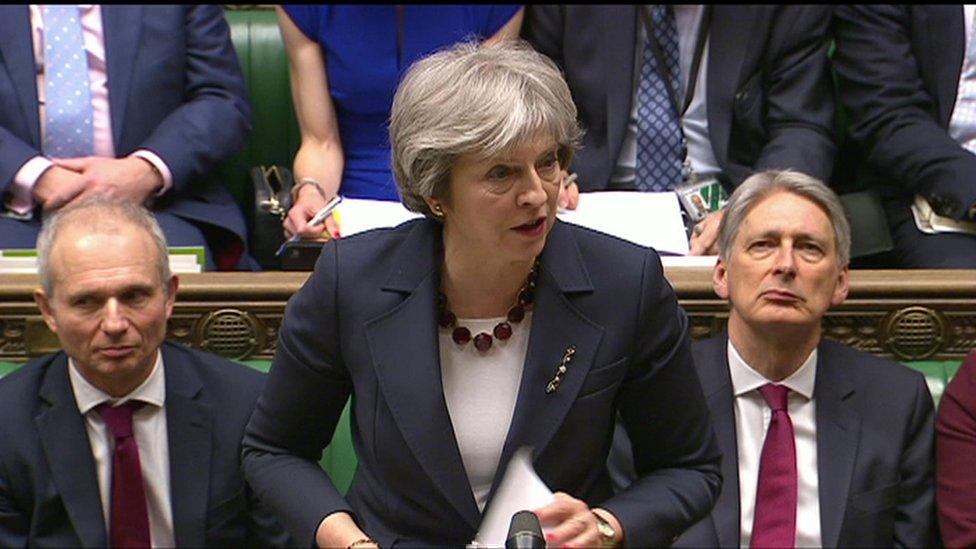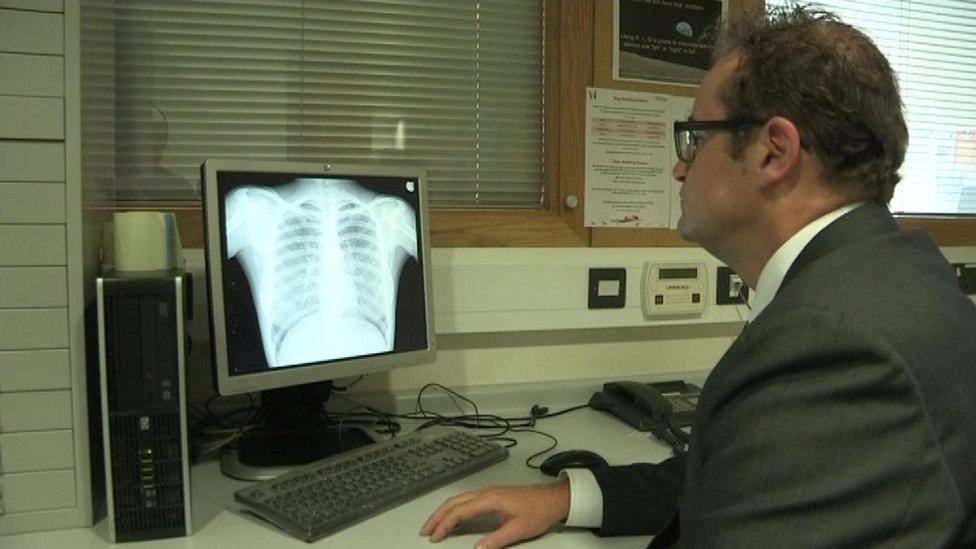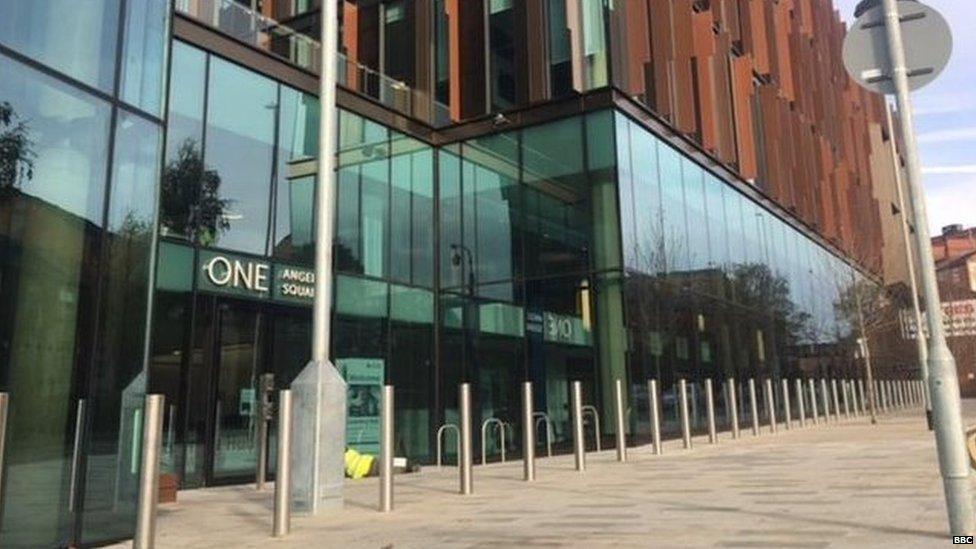Week ahead in Parliament
- Published

Theresa May made two Commons statements on the Salisbury attack over three days - there are likely to be further updates to MPs
Another week and still no sign of the big Brexit measures due before the Commons: the Trade Bill; the Taxation (Cross Border Trade) Bill; and less sign still of the promised proposals to reform the immigration system. Unsure of its fragile Commons position, the government is holding them back. So there's a certain element of marking time at Westminster, with big general debates on Wales and the economy and a measure to set the Budget for Northern Ireland.
But with a diplomatic crisis under way, maybe the real drama will be supplied by further statements on Russia and the Salisbury incident. For the government these have the useful effect of re-opening Labour wounds, and rubbing in a little salt, so there must be a temptation to mark each new twist in the saga with another update to MPs.
In the Lords, meanwhile, tempers are visibly fraying as peers grind their way through the committee stage of the EU (Withdrawal) Bill. So far there have been no votes, barring an abortive attempt by the high priest of Remain, Lord Adonis, to force a 40-minute dinner break. But the government team is having a very rough ride and has retaliated by extending the sitting hours rather than granting many extra days for debate.
The point here is that more committee stage days would mean more report stage days - you normally get one report day for every two on committee - and more report days would mean more opportunities for votes which the government could lose. That crucial phase of the debate is due after Easter and the amendments honed during committee debates will start popping up just before the break.
Here's my rundown of the week ahead:
Monday 19th March
The Commons week opens (2.30 pm) with education questions with the usual post-weekend quota of urgent questions and ministerial statements following at 3.30pm.
The main legislating is on the Secure Tenancies (Victims of Domestic Abuse) Bill, which aims to ensure that when the Housing and Planning Act 2016 comes into force, requiring local authorities in England to offer only fixed-term tenancies, this will not apply to certain victims of domestic abuse. There is concern that victims of domestic abuse would be less likely to leave their homes if doing so would result in an offer of a tenancy with reduced security of tenure. It will probably be a short, uncontroversial debate.
Next is the general debate on Welsh Affairs, postponed from a few weeks back when the "Beast from the East" drove MPs home early.

Professor Edward McKone, from St Vincent's University Hospital in Dublin, says Orkambi results in clinical benefits, including improved lung function
In Westminster Hall (4.30 pm) MPs debate e-petition 209455 on giving people with cystic fibrosis access to the drug Orkambi. The petition, which attracted 114,876 signatures, argues that "precision medicines" like Orkambi tackle the cause of the condition and that it slows the decline in lung function, the most common cause of death for people with cystic fibrosis, by 42 per cent.
In the Lords (2.30 pm) questions to ministers range across the number of children trafficked to the UK who have applied for asylum and the universal service obligation for broadband.
Then peers resume their yomp through the European Union (Withdrawal) Bill where the issues likely to come up include tackling violence against women and girls, child maintenance, delegated powers, the sifting procedure for orders under the bill, and perhaps the definition of 29 March 2019 as exit day. There will be no dinner break and another very late sitting is on the cards.
Tuesday 20th March
MPs gather at 11.30 am for health and social Care questions. Urgent questions or statements may follow at 12.30pm.
Then the Conservative former cabinet minister Maria Miller presents a Ten Minute Rule Bill on fire safety information. She wants landlords to be required to give tenants in high-rise blocks an annual update on fire safety in their premises. She says some residents in converted office blocks in her constituency have no central alarm systems, and have raised this issue with her.
Next, MPs will be debate the Northern Ireland Budget (Anticipation and Adjustments) Bill, which authorises spending that would have gone through the Northern Ireland Assembly, had it not collapsed.
In Westminster Hall (9.30 - 11 am) the first debate is on investment in local infrastructure to secure new homes in the East Midlands. New Conservative MP Lee Rowley wants ministers to acknowledge that more housing is needed in parts of the East Midlands, and to support it as the fastest growing region outside of London and South East, with a special focus on infrastructure, particularly roads and rail. This would feed into the regions continuing growth, he argues, and help win public support for more housing developments.

MPs will be debating whether there is a crisis in local authorities - a government review into Northamptonshire County Council has recommended it should be scrapped
In the afternoon (2.30 - 4 pm) Labour's Mike Amesbury - a former councillor on Manchester City Council - leads a debate on the National Audit Office report into the financial sustainability of local authorities , external. The NAO is the official financial watchdog and Mr Amesbury says their report highlights a crisis in local authorities, which has been underlined by the financial woes of Northamptonshire County Council, now facing abolition. He says the NAO found that funding is down by almost 50 per cent, whilst demand for services like adult and children's social care and homelessness support has risen. At the same time the burden of funding services has shifted significantly on to local taxpayers, and the report concludes that there "are now risks to statutory services". He wants the debate to highlight the seriousness of the crisis and the need for government to respond.
Even more contentious may be the debate on Scottish welfare powers (4.30 - 5.30 pm) led by Scottish Conservative, Bill Grant. The Scotland Act 2016 gave the Scottish government new powers on social security, including direct control of some benefits. Expect another rather shouty encounter with the Conservatives accusing their SNP rivals of demanding more powers and then failing to make full use of them.
In the Lords (2.30 pm) questions to ministers include crossbench nursing expert Baroness Watkins of Tavistock asking about enabling women undergoing early medical abortion to take the second dose of the medication, misoprostol, at home.
There are a couple of contentious items in the Lords which could lead to votes. First the report stage of the Nuclear Safeguards Bill, where the issues include ensuring Euratom or other agreed structures for nuclear cooperation remain in place after Brexit.
Then comes a statutory instrument regret motion from Labour peer Lord Bassam on changes in entitlement to free school meals and milk - this covers much the same ground as the Commons vote on these measures, also forced by Labour.
Wednesday 21st March
The Commons opens (11.30 am) with Northern Ireland questions, kicking off another Northern Ireland flavoured day.
Prime Minister's Questions follows at noon. Watch out for the mood on the Labour benches after a week which saw divisions re-opened, in the wake of the Salisbury poisoning.
Next comes a Ten Minute Rule Bill - the Human Fertilisation and Embryology (Welfare of Women) Bill, proposed by Labour's Siobhain McDonagh. It aims to amend the Human Fertilisation and Embryology Act 1990 to improve the welfare of women undergoing any treatment to help them conceive.
She says the current law governs the behaviour of IVF clinics and while it requires them to take into account the "welfare of the child" it ignores the welfare of women. With 1 in 6 women having trouble conceiving, increasing numbers of women are now turning to assisted reproduction. Siobhain McDonagh says there is a statutory gap which raises serious concerns about the safety of women during IVF treatment.
Then MPs turn to the Northern Ireland (Miscellaneous Provisions) Bill - another measure dealing with the implications of the continued suspension of the Northern Ireland Assembly.
There's even a Northern Ireland MP leading the adjournment debate, when the DUP's Jim Shannon raises the sport of shooting at the 2022 Birmingham Commonwealth Games
In Westminster Hall the SNP's Dr Philippa Whitford leads a debate (9.30 - 11am) on the effect of Welfare Reform and Work Act 2016. She is a member of the all party parliamentary group on health in all policies, which produced a report concluding that working people on low incomes, particularly families with children, had lost proportionately more of their income than any other group since 2010 as a result of tax and benefit changes. The reports warned that those widening inequalities would become intergenerational.
My eye was also caught by the new Labour MP Dr Paul Williams's debate (4.30 - 5.30pm) on the UK's future relationship with the EU on international development. He will argue that the UK has a proud history of working with EU partners to help some of the poorest parts of the world, but with the prospect of Brexit, there is now uncertainty about how the relationship will work in future.

Committee inquiry into Carillion wraps up this week with questions to the Business Secretary Greg Clark and the Work and Pensions Secretary Esther McVey
My committee pick is the joint hearing by the Work and Pensions Committee and the Business Committee (9.15 am) on Carillion with Business Secretary Greg Clark and Work and Pensions Secretary Esther McVey MP. It will wrap up their intensive inquiry into the collapse of the public sector mega-contractor, and the role played by the Carillion board, its auditors and others. Some of the evidence so far has been jaw-dropping.
In the Lords (11am) peers resume their debate on the detail of the European Union (Withdrawal) Bill with day nine of the committee stage. The main event here will be the first outing for the government's long-promised amendments to pass powers from the EU to the devolved administrations. This remains one of the trickiest aspects of the bill, both technically and politically, with plenty of potential for bust-ups with the SNP Scottish government in particular.
A complicating factor is that the SNP, by ancient tradition, does not nominate peers and therefore has no direct representation in the Lords. Maybe Plaid Cymru's Dafydd Wigley will put their point of view. And further down the line, the refusal of "legislative consent" by the Scottish Parliament and Welsh Assembly could embolden peers to take a tough line with the government on these amendments.
At 3pm there's a break for question time - which will include the Green Party's Baroness Jones of Moulsecoomb asking about the tactic of undercover police officers forming sexual relationships to develop their cover stories. After half an hour or so of questions, peers will return to the Withdrawal Bill
Thursday 22nd March
The Commons day opens (9.30 am) with Digital, Culture, Media and Sport questions followed by questions to the Attorney General, and then the weekly business statement from the Leader of the House, Andrea Leadsom. The main event is a general debate on the economy.
In the Lords (11am) question time includes another outing for a regular concern - permitting US companies to bid for NHS contracts as part of any future UK-US trade deal, from Labour's Lord Brooke of Alverthorpe.
Peers will then debate the 2018 Commonwealth heads of government meeting, and their International Relations Committee's report on this issue - led by the former cabinet minister Lord Howell of Guildford.
Then come some slightly unusual measures - changes to Church law that require parliamentary approval. In the Commons these are normally dealt with by the Ecclesiastical Committee, a body which meets so rarely that some of its members don't even know they're on it but in the Lords they are debated on the floor of the House with a Bishop, in this case the Lord Bishop of Rochester, leading the debates.
Finally, there's a short debate on the support available to survivors of domestic abuse led by Baroness Lister of Burtersett, a Labour peer and professor of social policy.
Friday 23rd March
The Commons isn't sitting but the Lords meet at 10am to debate the detail of two private members bills.
First up is the committee stage debate on the House of Lords (Hereditary Peers) (Abolition of By-Elections) Bill. The bill does what it says on the tin, ending the system of by-elections, in which handfuls of hereditary peers elect new members to their ranks when one of them dies. The Labour peer, Lord Grocott has already made one attempt to end the system and this second go is shaping up to be a bit of a grudge match with his nemesis, the Conservative former minister Lord Trefgarne. Last time around he put down 60 amendments at the last moment, in an attempt to use up all the available time for the bill in an epic filibuster. This time the number of his amendments has decreased slightly earlier but round two is clearly on.
Peers will also debate the Conscientious Objection (Medical Activities) Bill, which seeks to clarify medical practitioners' rights to conscientious objection to participation in withdrawal of life-sustaining treatment and in fertility treatment and abortions. There were some suspicions about the purpose of the bill when it was introduced by the crossbencher, Baroness O'Loan , but there is currently no sign of any amendments. If that remains the case this committee stage debate will be a pretty brief encounter.